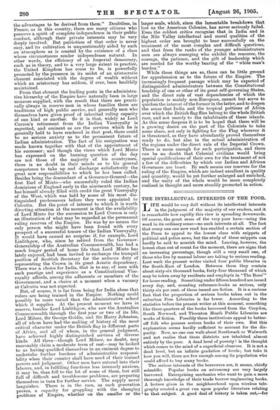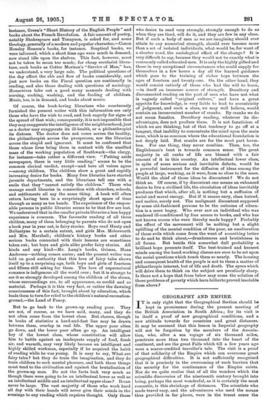TAM E would be very dull without its intellectual interests in
the judgment of the majority of our readers, and it is remarkable how rapidly this view is spreading downwards. Of course, the great mass of the very poor have—using the word in its ordinary sense—no such interests at all. The fact that every one can now read has enabled a certain section' of the Press to appeal to the lowest class with snippets of political and police news, but the study of these snippets can hardly be said to nourish the mind. Leaving, however, the lowest class out of count for the moment, there are signs that an increasing percentage, though still a very small one, of those who live by manual labour are taking to serious reading. Last week the present writer visited four public libraries in the South-East of London. Between them they contain about sixty-six thousand books, forty-four thousand of which may be taken away by residents and employes in "The Bore" for home reading. Something under fifteen hundred are issued every day, and, counting reference-books as serious, only thirty-six per cent. of those issued are fiction. It is a curious fact that the proportion of serious books taken out in the suburban Free Libraries is far lower. According to the statistics before the present writer at this moment, something like three-quarters of the books borrowed from the Croydon, South Norwood, and Thornton Heath Public Libraries are works of fiction. Possibly these institutions appeal to better- off folk who possess serious books of their own. But this explanation seems hardly sufficient to account for the dis- parity. Now, no one can walk about Southwark or Walworth and not realise that these districts are inhabited almost entirely by the poor. A dead level of poverty ! is the thought which comes to the mind of a superficial observer. It is not a dead level, but an infinite gradation of levels ; but take it bow you will, there are few enough among its population whO could afford to buy many books.
The serious interests of the borrowers are, it seems, chiefly scientific. Popular books on astronomy are very largely borrowed. Enterprising mechanics who want to gain a more thorough knowledge of their trade borrow engineering books. A lecture given in the neighbourhood upon wireless tele- graphy created a great run upon popular literature relating to that subject. A good deal of history is taken out,—for instance, Green's "Short History of the English People" and books about the French Revolution. A fair amount of 'poetry, notably Shakespeare and Tennyson, is asked for, and some theology, generally of a modern and popular character,—Canon Hensley Henson's books, for instance. Sceptical books, we were informed, which a short time ago were much in demand, now stand idle upon the shelves. This fact, however, must not be taken to mean too much ; for cheap secularist litera- ture, such books as Cotter Morison's "Service of Man," has, we understand, a very large sale. The political questions of the day affect the ebb and flow of books considerably, and just now books on the Fiscal question are continually in reading, and also those dealing with questions of sociology. Housewives take out a good many manuals dealing with nursing, cooking, washing, and the feeding of children. Music, too, is in demand, and books about music.
Of course, the book-loving librarians who courteously furnished the present writer with this information see only those who have the wish to read, and look eagerly for signs of the spread of that wish; consequently, it is not impossible that they may exaggerate the intelligence of the neighbourhood, j ust as a doctor may exaggerate its ill-health, or a philanthropist its distress. The doctor does not come across the healthy, the philanthropist across the prosperous, nor the librarian across the stupid and ignorant. It must be confessed that those whose lives bring them in contact with the ungifted mass of the working population of Southwark—the clergy, for instance—take rather a different view. "Putting aside newspapers, there is very little reading," seems to be the common clerical verdict, except—and here all voices agree —among children. The children show a great and rapidly increasing desire for books. Many free libraries have started juvenile departments, and the librarians tell one with a smile that they "cannot satisfy the children." Those who manage small libraries in connection with churches, schools, and settlements all say the same thing. A book will often return having been in a surprisingly short space of time through as many as ten hands. The experience of the respon- sible persons in public libraries seems to be that few are lost. We understand that in the smaller private libraries a less happy experience is common. The favourite reading of all these children, many of them belonging to parents who do not open a book year in year out, is fairy stories. Boys read Henty and Ballantyne to a certain extent, and girls Mrs. Ifolesworth and Mrs. Marshall ; children's history books and other serious books connected with their lessons are sometimes taken out; but boys and girls alike prefer fairy stories. All kinds and any kind—Mr. Lang's books, Grimm, Hans Andersen—nothing comes amiss ; and the present writer was told on good authority that this love of fairy tales shows itself up to a surprising age, both boys and girls of fourteen and fifteen still asking for them. The love of supernatural romance is indigenous all the world over ; but it is strange to see it so strongly developed among the children of the slums, whose surroundings are, to all appearance, so sordid and so material. Perhaps it is this very fact, or rather the dawning consciousness of this fact, brought about by education, which leads them to turn for relief to the children's natural recreation- ground,—the Land of Fancy.
But to go back to the grown-up reading poor. They are not, of course, as we have said, many, and they do not often come from the lowest class. But classes, though in books of statistics a hard-and-fast line may be drawn between them, overlap in real life. The upper poor often go down, and the lower poor often go up. An intelligent boy of the lowest class, whose constitution will allow him to battle against an inadequate supply of food, fresh air, and warmth, may very likely become an intelligent and highly skilled workman, especially if he acquired the habit of reading while he was young. It is easy to say, What are fairy tales ? but they do train the imagination, and they do train children to seek mental pleasure, and both these things must tend to the civilisation and against the brutalisation of the grown-up man. Do not the facts look very much as though there were going to be an intellectual lower as well as an intellectual middle and an intellectual upper class P It can never be large. The vast majority of those who work bard all day with their hands will never give their minds in the evenings to any reading which requires thought. Only those who desire to read very strongly, strongly enough to do so when they are tired, will do it, and they are few in any class. But if such a body of men as we are imagining should ever attain to any numerical strength, should ever become more than a set of isolated individuals, what would be, for want of a shorter word, the sociological effect of the change ? It is very difficult to say, because they would not be exactly what is commonly called educated men. It is only the highly gifted and those in very exceptional circumstances who could supply for themselves in a few hours a day all the learned guidance which goes to the training of richer boys between the ages of fourteen and twenty-one. On the other hand, they would consist entirely of those who had the will to learn, —in itself an immense source of strength. Desultory and disconnected reading on the part of men who have not what is vaguely called "original culture," and have a great appetite for knowledge, is very liable to lead to eccentricity of judgment, and such a class, we may well believe, would contain an inconvenient number of cranks. By cranks we do not mean fanatics. Desultory reading, whatever its dis- advantages, does not produce them. It is not fanaticism of which we are thinking, but of that tendency to go off at a tangent, that inability to concentrate the mind upon the main issue, which is so common where the educational foundation is not deeply laid. But cranks are for the most part harm- less. For one thing, they never combine. Then, too, the Englishman's bent is towards common sense. The great majority in all ranks of life are blessed with a fair amount of it in this country. An intellectual lower class, in spite of some serious and inevitable defects, would be a powerful instrument for the diffusion of ideas among the people at large, working, as it were, from so close to the mass. Would the chief of those ideas be discontent P We do not think so. Of course, if by discontent one means an enhanced desire to live a civilised life, the circulation of ideas inevitably produces that which, after all, is nothing but a suffusion of social and moral energy. But if it means envy, class hatred, and malice, surely not. The malignant discontent supposed by some old-fashioned persons to be the outcome of educa- tion is a mere bogey. Who ever saw an individual who was rendered ill-conditioned by free access to books, and who has not known scores who were thereby made happy ? Probably the effect of the movement will be nothing but a slight uplifting of the mental condition of the poor, an amelioration of those evils which come from the want of something better to do and to think about,—drunkenness and brutishness in all forms. But beside this somewhat dull probability a brilliant hope presents itself. The beat-trained and keenest minds among the hand-working classes are sure to be set upon the social questions which touch them so nearly. The housing and consequent health of the people is not to them a matter of philanthropic interest, but of life and death. The spurs which will drive them to think on the subject are peculiarly sharp. Is there not a hope that from below may come the solution of those problems of poverty which have hitherto proved insoluble from above ?



































 Previous page
Previous page